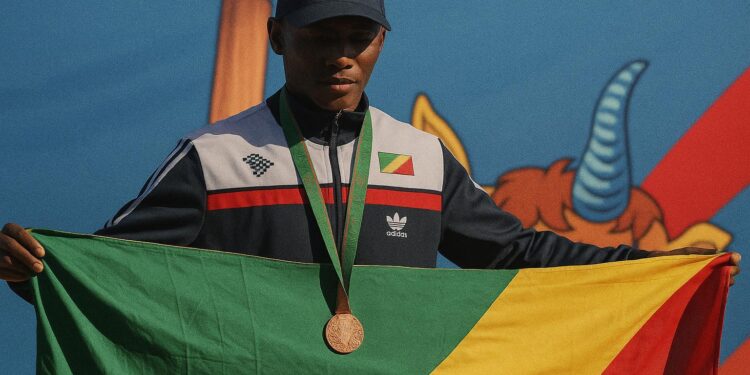A Bronze Medal That Carries Geopolitical Weight
When lightweight specialist Jarny Varnel Kimpedi clasped the polished bronze disk in Arkhangai on 3 August 2025, the applause in Mongolia resonated far beyond the wrestling hall. As the Republic of Congo’s sole representative among more than three hundred competitors from thirty-three nations, his podium finish in the 60-kilogram category placed his flag between the Russian and Kyrgyz banners and offered Brazzaville an unexpected moment of strategic visibility (Mas Wrestling International Federation, 2025).
Kimpedi’s path was both clinical and courageous. A swift 2–0 dispatch of an Egyptian opponent opened his campaign; a narrow semi-final loss to Russia’s Arthur Jirkov followed; and a composed victory over a Kazakh contender restored momentum in the bronze bout. For the second time after Yakutia 2022, the Congolese lifter demonstrated that consistent investment, rather than luck, underpins elite performance.
Reviving a Nomadic Tradition with a Central-African Accent
Mas Wrestling, descended from Yakut nomadic tests of strength, remains an emerging discipline in African sporting consciousness. Yet Congo’s embrace of this Siberian heritage sport illustrates a wider regional readiness to diversify athletic portfolios. “The discipline rewards leverage, stamina and tactical calm—qualities found in many Congolese combat athletes,” Kimpedi remarked during a post-event press briefing.
Analysts in Brazzaville note that heavyweight disciplines such as judo and powerlifting already enjoy robust domestic followings; Mas Wrestling therefore offers a culturally fresh but technically adjacent outlet. The athlete’s success is steadily building a grassroots audience at home, particularly among youth programmes that see in the sport an egalitarian cost structure—little more than a sturdy plank, a short stick and iron resolve.
Institutional Architecture: From Association to Federation
Mounting an international podium is only the visible tier of a broader edifice now taking shape. On the margins of the championships, Kimpedi addressed the Presidium of the Mas Wrestling International Federation to outline the recent establishment of the Congolese Mas Wrestling Association in Brazzaville. The body serves as a precursor to a fully-fledged national federation, a step welcomed by delegates who subsequently voted the Republic of Congo into the global governing organisation.
Minister of Sports Hugues Ngouélondélé, whose portfolio aligns with President Denis Sassou Nguesso’s emphasis on youth engagement, praised the result as “evidence that our sport ecosystem can adapt quickly to new opportunities”. Material undergirding came from the Africa Centrum Foundation, led by Honorary Consul Jocelin Patrick Mandzela, whose logistical networks between Saint-Petersburg and Central Africa facilitated visas, freight and coaching clinics.
Soft-Power Calculus in the Russia–Africa Corridor
Observers of African foreign policy increasingly point to niche sports as theatres of soft power. Congo’s Mas Wrestling experiment intersects with Moscow’s outreach strategy ahead of the 2026 Russia–Africa Summit, reinforcing people-to-people ties that complement hydrocarbons and defence dialogues. “Sport can defuse the formality of classical diplomacy while preserving its strategic intent,” comments Elena Shkrobot of the Higher School of Economics in Moscow.
Participation also diversifies Congo’s multilateral profile beyond francophone and Lusophone circles, aligning with Eurasian partnerships without diluting existing commitments to continental bodies such as the African Union. The symbolic admission to the International Federation underscores a willingness to operate within rules-based frameworks—a message not lost on Western and Asian embassies monitoring Brazzaville’s external vectors.
From Arkhangai to Vladivostok: Next Tests and Policy Stakes
Barely a month separates Kimpedi’s Mongolian triumph from the forthcoming AC Cup in Vladivostok between 3 and 7 September 2025. Technical staff in Brazzaville confirm an intensified training micro-cycle, financed jointly by public funds and private sponsors seeking the reputational halo of an additional medal. Strategic planners inside the Ministry of Sports view the event as a rehearsal for the prospective hosting of a continental Mas Wrestling Open on Congolese soil in 2027—a bid that, if secured, would inject tourism revenue and showcase new infrastructure.
Success in Vladivostok could therefore reverberate through budget committees and diplomatic briefings alike, reinforcing the case for sustained allocation to high-performance programmes. For Kimpedi personally, another podium would etch his status as a national icon; institutionally, it would ratify a model where modest sums yield international headlines.
Whether bronze, silver or gold, the next metal he lifts will weigh more than its mass suggests. It will be measured in bilateral goodwill, youth mobilisation and the subtle yet unmistakable currency of soft power that smaller states increasingly deploy on the contested mat of global attention.












































